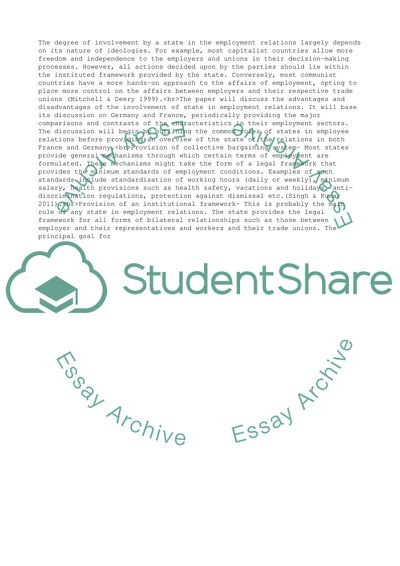Cite this document
(What are the major advantages and disadvantages regarding the states Essay, n.d.)
What are the major advantages and disadvantages regarding the states Essay. https://studentshare.org/human-resources/1851468-what-are-the-major-advantages-and-disadvantages-regarding-the-states-involvement-in-employment-relations-compare-and-contrast-developments-in-at-least-two-european-countries-important-note-essays-have-to-answer-the-question-selected-by-presenting-ev
What are the major advantages and disadvantages regarding the states Essay. https://studentshare.org/human-resources/1851468-what-are-the-major-advantages-and-disadvantages-regarding-the-states-involvement-in-employment-relations-compare-and-contrast-developments-in-at-least-two-european-countries-important-note-essays-have-to-answer-the-question-selected-by-presenting-ev
(What Are the Major Advantages and Disadvantages Regarding the States Essay)
What Are the Major Advantages and Disadvantages Regarding the States Essay. https://studentshare.org/human-resources/1851468-what-are-the-major-advantages-and-disadvantages-regarding-the-states-involvement-in-employment-relations-compare-and-contrast-developments-in-at-least-two-european-countries-important-note-essays-have-to-answer-the-question-selected-by-presenting-ev.
What Are the Major Advantages and Disadvantages Regarding the States Essay. https://studentshare.org/human-resources/1851468-what-are-the-major-advantages-and-disadvantages-regarding-the-states-involvement-in-employment-relations-compare-and-contrast-developments-in-at-least-two-european-countries-important-note-essays-have-to-answer-the-question-selected-by-presenting-ev.
“What Are the Major Advantages and Disadvantages Regarding the States Essay”. https://studentshare.org/human-resources/1851468-what-are-the-major-advantages-and-disadvantages-regarding-the-states-involvement-in-employment-relations-compare-and-contrast-developments-in-at-least-two-european-countries-important-note-essays-have-to-answer-the-question-selected-by-presenting-ev.


